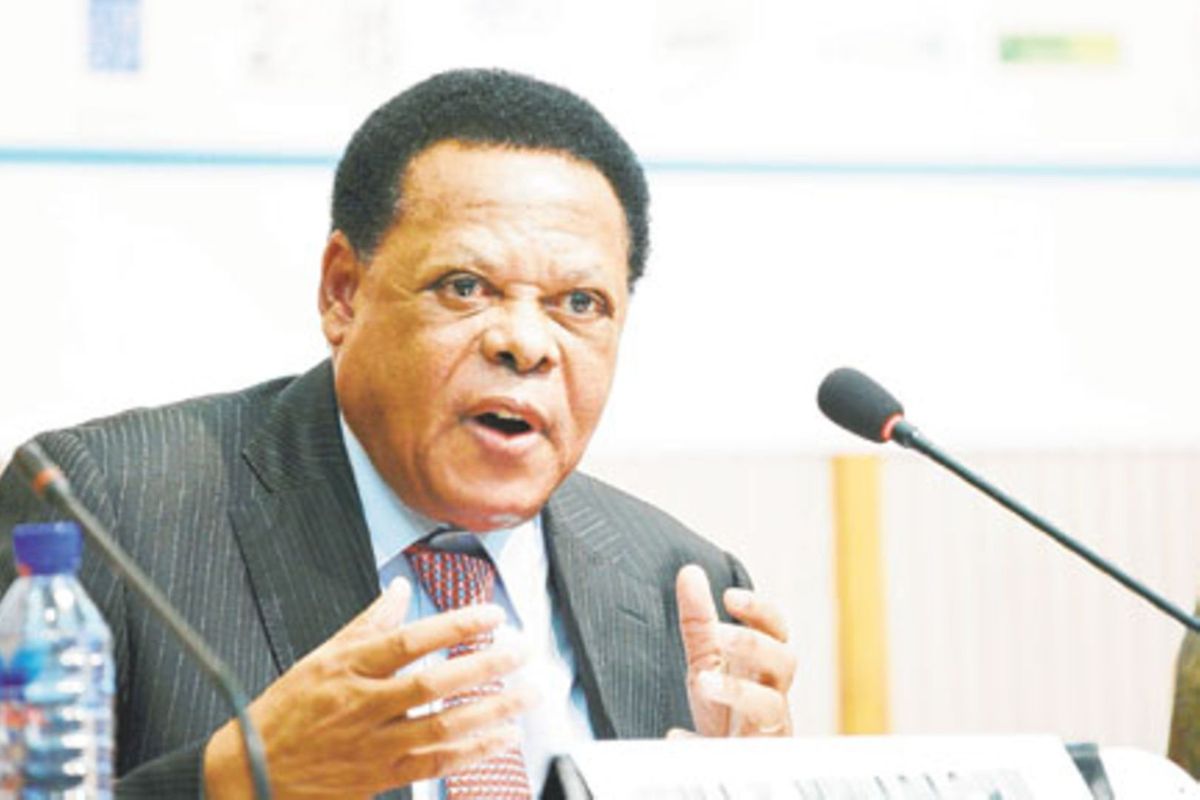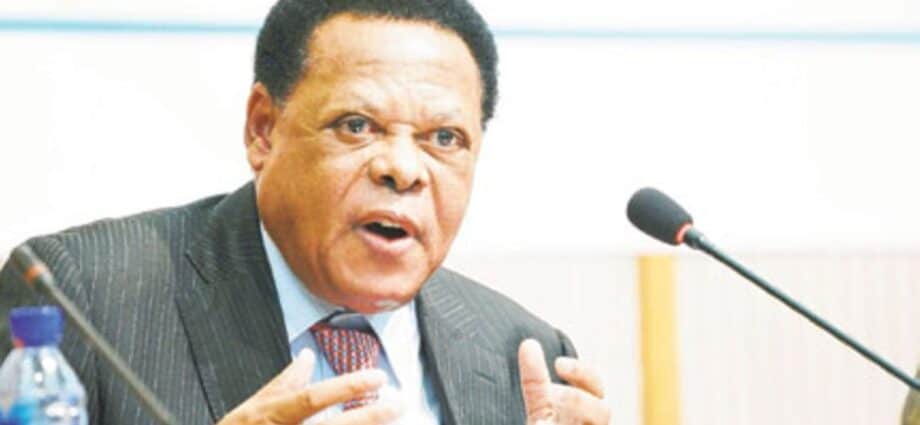
Sunday the 30th March saw the burial in the region of Tanga of Ambassador Juma Volter Mwapachu, popularly known as JV to different age groups.
Such was the array of mourners beginning in Dar es Salaam on the Saturday and Tanga the next day that I dare say only someone like JV could have pulled off such a farewell act. Being a sports enthusiast, I’m reminded of the words this week of the boss of the Haas Formula 1 Grand Prix race team, Gunther Steiner, on the Ferrari legendary driver Lewis Hamilton: “All this once again speaks of the magnetic attraction of Hamilton’s personality, which stands out even against the general background of Ferrari.”
One needed to have witnessed the arrival in style of a contingent from the East African Community (EAC), where JV had been the secretary-general between 2006 and 2011. It was indeed a pregnant moment.
Truth be told, the EAC could have been represented by just an individual or two but no, over ten Community staff felt the urge to pay homage to Balozi JV even if it meant departing for them Arusha at 3am and returning the same day. One of the representatives right at the end confided to a few of us after the burial some moving stories that amount to a justified celebration of the man.
Now juxtapose that with the University of Dar es Salaam (Udsm) – which can’t be gainsaid was very dear to JV going back to the years of his legal studies in the 1960s, as well as his leadership roles twenty years after – that was represented in the most underwhelming fashion to put it mildly. Ordinarily JV’s contributions at Udsm spanning a continous period of about 15 years ought to have been a matter of colossal pride for the institution. The awarding of a Doctor of Literature Degree to JV in 2005 by Udsm should not have meant in any way that they had done all they needed to do. It is telling that JV’s successor as president of the Convocation in 2003 upon his own recommendation was a former prime minister by the name Joseph Sinde Warioba. Notably JV himself was elected in 1988 in abstentia.
And as if the Udsm story ain’t enough, upon the end of JV’s tenure at the EAC, he was appointed by the-then head of state, Jakaya Kikwete, to head the Governing Council of the nascent University of Dodoma.
A major attribute of JV that was intertwined with his significant roles at public universities was the infinite pursuit of knowledge and the equal desire to have it disseminated. In spite of health challenges in his final years, JV so admirably took the trouble to put pen to paper.
Personally speaking, my own interest in writing was largely driven by JV himself. Precious few will be aware that he established a magazine in 1993 known as Change. It lasted piteously only five years.
This magazine in JV’s words from his book entitled A Journey was “aimed to inspire professional and intellectual
Tanzanians and others to address some of the burning issues facing our country and the region.”
JV would encourage me as his very young nephew and student then at the International School of Tanganyika, to contribute something along the footsteps of my late father, Mark Bomani. I never did back then but as I would go onto university and become increasingly vocal, JV would throw down the gauntlet by simply saying ‘Andrew write.’ Talking was insufficient for him. Curiously though, when the writing bug caught on with me he would hardly flatter in his comments such that I got a strong sense his views were at variance with mine.
I recount once remarking to JV at a members’ club that ‘I pull no punches’, to which he responded in keeping with boxing parlance that my punches were ‘below the belt’.
Putting aside our bumpy relationship, it speaks volumes of the prodigy in JV that he was employed as editor of the Police Journal during his university holidays. I really wonder what became of such a journal.
Many years later his way with the pen combined with his legal training to write the Memorandum and Articles of Association of the Tanzania Chamber of Commerce, Industry and Agriculture ( TCCIA).
Speaking of TCCIA, I’ll say that one could easily be forgiven for imagining that JV as a result of his intimate ties with business leaders was a captain of industry.
He would even become a founder member of the East African Business Council (EABC) in 1997 and later its chairman between 1999 and 2000.
His original role at EABC is corroborated by a most distinguished Kenyan of Asian extraction, Mzee Manu Chandaria, when it is stated in a recent biography that, “using his rapport with private sector leaders in Tanzania and Uganda, Manu swiftly engaged his counterparts. Manu arranged a meeting with Juma Volter
Mwapachu, the chairman of the Confederation of Tanzania Industries, and the late Dr James Mulwana, a Ugandan industrialist, entrepreneur, and a member of the Uganda Manufacturers Association. The purpose of the meeting was to create joint synergies and effectively represent the interests and concerns of businesses from the three founding EAC member countries. This marked the beginning of the consultations spearheaded by Manu, Mwapachu and Dr Mulwana that culminated in the establishment of the EABC.
His EABC history gets more interesting as narrated by the late business mogul, Reginald Mengi.
In pursuit of EABC quest for institutionalisation, Ambassador Mwapachu facilitated a special dialogue meeting with the five heads of state at the EAC summit in Kigali in 2008. The whole exercise came a cropper and had JV in his book stating that Tanzania was the principle stumbling block.
One might go further and ask could it also be destiny that someone who became the EAC SG in 2006 had participated in its revival way back in 1992 with three other individuals from Tanzania, Uganda and Kenya. JV shares: “We met in 1992 and agreed to establish the East African Cooperation Forum as a platform to promote the revival of the EAC. In early 1993, we organised a conference in Arusha to deliberate on the importance of reviving the EAC.”
As a consequence of all his tireless efforts on matters EA and regional integration in Africa, the National University of Rwanda in 2012 conferred on Balozi JV the degree of Doctor of Political Sciences and the year before that
President Kibaki decorated him with the Order of Moran of the Order of Golden Heart (MGH) for his leadership of the EAC.
With all of the above on EA, it is my considered view that if there was a higher post tailor-made for JV then it was to become the African Union Commission Chairperson. It is equally my considered view that he was the best foreign minister Tanzania never had. A look at a few of the past foreign ministers who performed under Nyerere and my thinking leads me to state that they were effectively an arm of Nyerere. Mwalimu was the real foreign minister of Tanzania.
JV though had his inimitable style that can be traced to his time as a university student in 1967 and his impressive presentation at a Red Cross Conference in Canada on Promoting World Peace. It is revelatory that during his chairmanship of the Tanu Youth League branch of the Udsm that he won resoundingly despite reluctance, he was instructed by Nyerere to join his entourage on a state visit to China and North Korea. As I close my tribute, in the foreword to JV’s autobiography that also contains speeches and writings, a former
African Development Bank (ADB) president, Donald Kaberuka, makes reference to JV as a ‘development specialist’ among many other things.
I found the ‘development specialist’ epithet most appropriate for JV. There is no absolutely no sphere of development that he has left out in his ‘serial’ writings that were no less enriched by his serving for 3 years in the 1970s as a district development director in rural Bariadi, Shinyanga and finally urban Ilala at a time of intensive government programmes. It is instructive that JV upon the presidential appointment informed his boss at NBC, the late Amon Nsekela, that the appointment was constructive as it would enable me to witness, first hand, rural life and how rural populations were governed.;
JV I reckon became a veritable administrator within that period.
It is no surprise that JV in his book touches on the benefit of the course of development studies at UDSM as compulsory under the Institute for Development Studies (IDS) of which JV served on the board whilst as a DDD. It appears the course is no more, which is something most deplorable.
As a crowning achievement for JV as a ‘development specialist’, in 2012, he was elected as Global President of the Society for International Development (SID).
In this regard, one can say it is a pity that local civil society groups of which JV considered himself a leader through and through, have been off the radar in recognising his dedication to seeing their growth from an inchoate stage. It is really indicative of the state of affairs in Tanzania.
There is an enormous amount of writing one can do if space permitted about the life and times of JV including what I believe was a disastrous campaign he took to heart for the late Edward Lowassa.
Today my hope and prayer is that we take on from JV’s ‘serial’ writings that at their core are about a profound yearning to see a developmental state in action in Tanzania. Intellectual input is so critical. It really boggles the mind to that his magazine “suffered sustainability due to shortage of funding sources through advertisements in Tanzania.” I mean really? And the year 1998 when it ceased being published was during the presidency of
Benjamin Mkapa who JV was very well-disposed to and was indeed an erudite man so the question is what did he do in his capacity to forestall this demise?
Next to nothing is my quick answer. Mind you Big Ben revealed to us at the funeral of the former president of Kenya, Daniel arap Moi, that he was his political mentor. That being so, such journals like Change would find themselves limping in an environment imbued with worshipping the commanding heights of power.
My last word is that just as I stated that JV is the best foreign minister Tanzania never had, I extend that to say JV was the best Chancellor of the University of Dar they never had. And I told him of my wish when the late Ambassador Kazaura died in 2014. The position remained incredulously vacant for close to two years at which point in a sixth sense moment told me it was in all probability deliberate – and surely enough, his sense came to pass. That is commensurate with the Tanzania we have become!
Andrew Bomani is a political scientist and co-founder of the yet to be registered Independent People’s Party: [email protected]














